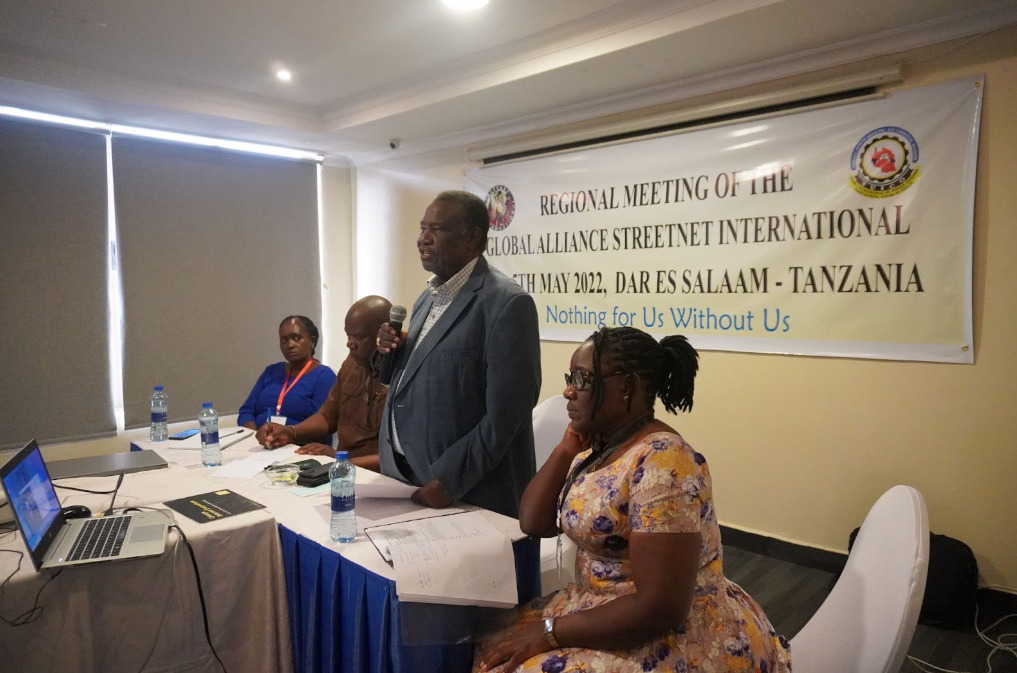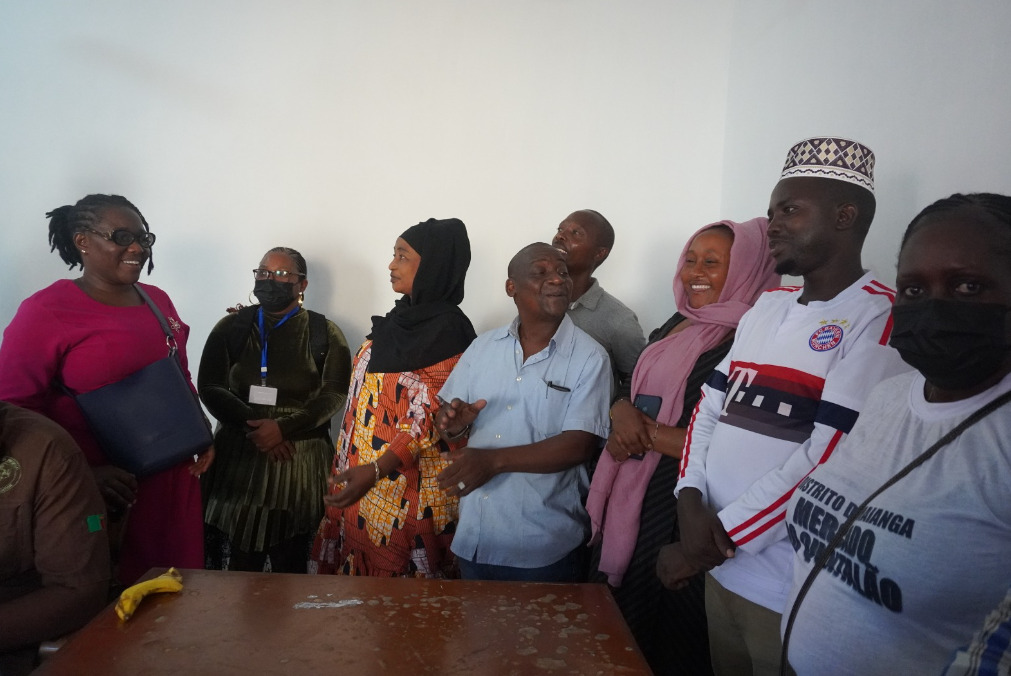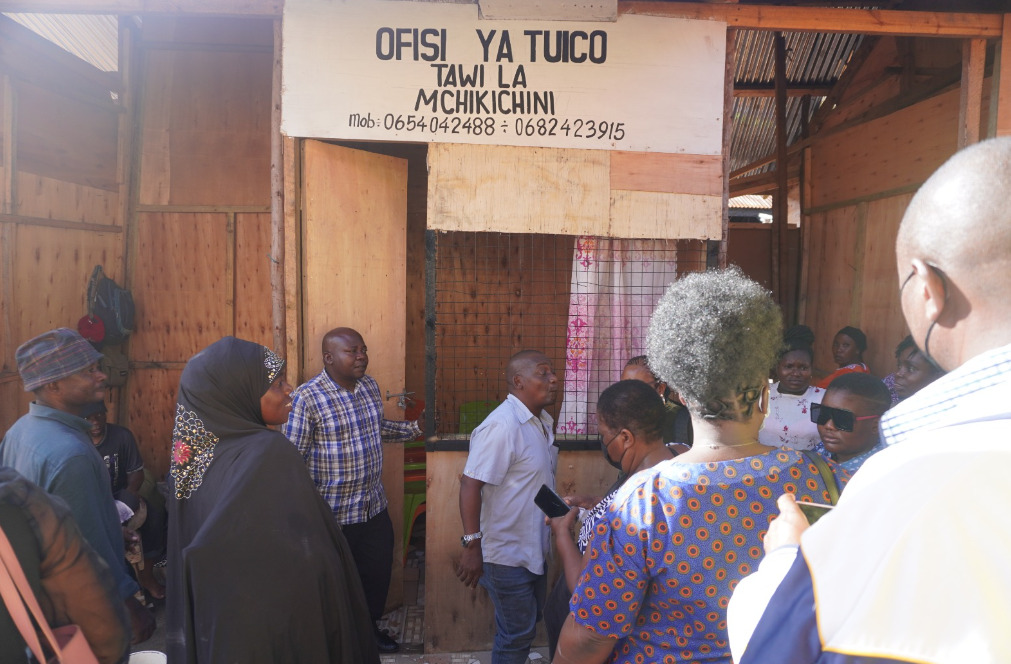Subscribe to our E-Letter!
Subscribe to our e-mail and stay up-to-date with news and resources from street vendors around the world.
From May 3rd-5th, StreetNet affiliates of Eastern and Southern Africa came together in Dar Es Salaam, Tanzania, for their first regional meeting after the start of COVID-19 pandemic. It was hosted by TUICO, StreetNet affiliate in Tanzania, and resulted in three productive days of discussion, planning and building solidarity.
StreetNet International has affiliates in over 50 countries. Our affiliates are united due to their commitment to the rights of street vendors and other informal traders, but particular countries and regions face specific common challenges. That is why it is important to provide affiliates with a space to debate and discuss, share experiences, and plan regional strategies together.
From March 2020 until May 2022, that space was online, due to the COVID-19 pandemic. However, we know that in-person gatherings are extremely important to build solidarity and unity. Which is why we organized, along with TUICO, the first hybrid (online and in-person) Regional Meeting of Eastern and Southern African affiliates.
There were 13 affiliates present in Dar Es Salaam: AEIMO (Mozambique); AVEMA (Zambia); AZIEA (Zambia) BOISA (Botswana); FENTASCH (Angola); KENASVIT (Kenya) ; KTB (Lesotho); MUFIS (Malawi) ; NIDAWU (Namibia); SAITA (South Africa); TUICO (Tanzania); UMAEU (Uganda); ZCIEA (Zimbabwe).
In addition, there were also four StreetNet staff members present: Jane Masta, Organizer for Eastern and Southern Africa; Evelyn Benjamin-Sampson, Organizer for West and Central Africa; Annelene Shahbaz, Admin and Finance Manager; and Margarida Teixeira, Communication and Media Manager. We were also joined by more delegates online, who participated throughout the meeting when they had the chance.
The meeting started off on May 3rd with welcome remarks by Margareth Ndagile of TUICO, Regional Focal Point and host organization, followed by video statements of International Coordinator Oksana Abboud and of President Lorraine Sibanda. General Secretary of the TUICO Boniface Yohana Nkakatisi also welcomed participants and expressed the importance of working and organizing informal economy workers for the national trade union center.

Participants had the chance to participate in a discussion with three experts on the informal economy: Pat Horn, SNI Senior Advisor, who focused on the international context for street vendors; Salonie Muralidhara Hiriyur of SEWA (India), who focused on social solidarity economy best practices from SEWA and Gaston Kikuwi from VIBINDO Tanzania, who provided insight into the local context of street vending.
The presentations were followed by stimulating discussions about the importance of an inclusive formalization process of informal economy workers; the issue of migration and how to foster a spirit of solidarity among both internal and foreign migrant workers; and how to continue to develop partnerships and a global voice for street vendors.
Participants were asked to identify key issues for the region. Some of the issues mentioned included challenges in resource mobilization, lack of data, political instability, violence and harassment, unfair taxation and the issue of cross-border trade. After this collective brainstorm, participants were presented with the StreetNet Strategic Plan 2020-2024 and tasked with coming up with specific strategic objectives for the region. Many of the objectives that participants defined were related to creating new committees or forums focused on specific issues, fostering more dialogue with national governments, as well as joint campaigning.
After focusing on general objectives, participants then had the chance to discuss specifically the issue of informal cross-border trade (ICBT), in a session facilitated by Organizer for West and Central Africa Evelyn Benjamin-Sampson. Participants identified common challenges and generally agreed on policy recommendations to harmonize policies and implement one-stop border points.
Regional Organizer Jane Masta facilitated a collective evaluation session about StreetNet’s performance. Some positive points highlighted by affiliates are the communication and support of StreetNet to their organizations, especially during the COVID-19 pandemic; the importance of trainings; the promotion of women’s leadership; and the investment of capacity-building and sharing of experiences.
However, affiliates also urged StreetNet to improve the dissemination of information regarding ILO Recommendation 204 and ILO Convention 190, to invest more in the social solidarity economy and in the sustainability of affiliates.
On the third day, participants were also introduced to the StreetNet website and communication channels, and had the chance to submit their feedback and suggestions.
In 2023, StreetNet will hold its 7th International Congress. Organizer Jane Masta presented the structure of the International Congress, the highest decision-making body of StreetNet, and its regulations. It is during the International Congress that Resolutions, the basis of StreetNet’s policy and decision-making, are discussed and approved. Therefore, participants came together in groups and discuss potential resolutions that are relevant for the Eastern and Southern Africa region.
Many of the proposed resolutions dealt with reviewing and updating StreetNet’s internal structure, with an emphasis on the inclusion of certain groups, such as young people and people with disabilities. New Committees were also proposed, such as Regional Committee on Climate Change, as well as new policies, such as a Policy on Eventualities/Disasters/Environmental catastrophes.
At the International Congress in 2023, affiliates will have the chance to work together and propose these new Resolutions and Policies.
Besides joining the official discussions and presentations, participants also had the chance to socialize and be together throughout the three days of the meeting. On the first day, TUICO with the support of StreetNet hosted a dinner for all participants and it was a great opportunity to get to know each other better.


On the third and last day, TUICO also gave a tour of local markets. They first introduced participants to a social enterprise devoted to exporting handicrafts from Tanzania rural workers, mostly women, to the international markets. Then, TUICO led us to a local market and hub of street vendors, where the organization has an office.
In general, participants considered that the Regional Meeting was successful and that it allowed affiliates to foster unity and solidarity, and to learn from each others’ experiences.
See a video summary of the meeting below:

By entering your personal data and clicking “Suscribe,” you agree that this form will be processed in accordance with our privacy policy. If you checked one of the boxes above, you also agree to receive updates from the StreetNet International about our work